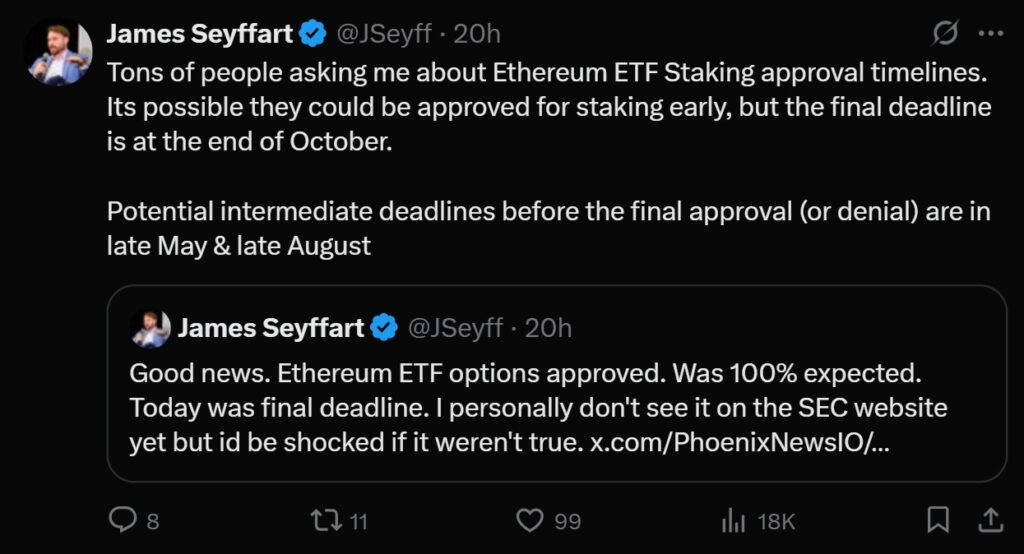In a significant step for the cryptocurrency landscape, blockchain infrastructure provider Figment has been chosen as the staking provider for 3iQ’s recently approved Solana exchange-traded fund (ETF). This development is part of Canada’s ongoing commitment to embrace digital asset financial products, showcasing the nation’s proactive stance in a rapidly evolving market.
Set to debut on the Toronto Stock Exchange on April 16 under the ticker symbol SOLQ, the 3iQ Solana (SOL) Staking ETF will leverage Figment’s expertise in institutional staking. The approval from the Ontario Securities Commission (OSC) not only paves the way for 3iQ but also allows other fund managers, including Purpose and Evolve, to explore opportunities in SOL ETFs. This regulatory nod reflects a broader trend of regulatory support for cryptocurrency initiatives in Canada.
As Bloomberg ETF analyst Eric Balchunas noted, these funds will have the ability to stake a portion of their SOL holdings through TD Bank, the second-largest financial institution in Canada.
According to 3iQ’s estimates, the SOL fund is projected to yield returns between 6% and 8%, enticing both seasoned investors and newcomers to the Solana ecosystem. This launch follows a series of successful initiatives by 3iQ, which led Canadian crypto ETFs with its spot Bitcoin ETF in 2021—an effort that netted over $1 billion in assets almost immediately.
While U.S. regulators have been slow to approve similar offerings, Canada has established itself as a pioneer in this domain. Recent endeavors, such as the launch of 3iQ’s Ether (ETH) ETF, have also positioned Canadian investors to benefit from staking rewards, further distinguishing them from their U.S. counterparts who are still awaiting such approvals.
This embrace of digital finance not only underscores Canada’s ambition to be a leader in the cryptocurrency space but also sets a curious precedent as the industry watches to see how U.S. regulators respond to this growing wave of innovation.
Canada’s Groundbreaking Steps in Digital Asset ETFs
The recent approval and launch of Canada’s first Solana exchange-traded fund (ETF) highlights significant advancements in the digital asset space and their impacts on investors.
- 3iQ’s Solana ETF Launch: The 3iQ Solana (SOL) Staking ETF is set to begin trading on the Toronto Stock Exchange on April 16 under the ticker SOLQ, representing a key moment in the adoption of digital asset products in Canada.
- Institutional Staking Support: Figment has been appointed as the staking provider for the ETF, enabling institutional staking for the SOL holdings, which could attract more investors looking for growth opportunities.
- Regulatory Approval: The Ontario Securities Commission (OSC) approved this ETF on April 14, paving the way for other fund managers to explore SOL ETFs, demonstrating a supportive regulatory environment for crypto assets in Canada.
- Estimated Yields: 3iQ estimates yields between 6% and 8% for the fund, which can entice investors by blending traditional investment yields with digital asset growth prospects.
- Comparative Regulatory Progress: Canada’s swift regulatory approval for crypto ETFs contrasts with the slower pace in the United States, potentially positioning Canada as a leader in the digital asset space.
- Successful ETF Models: The success of previous Canadian ETFs, like the spot Bitcoin ETF that reached $1 billion in assets quickly, sets a precedent that could attract new investments and encourage healthier market participation.
- Direct Access to Other Assets: The launch of an Ether ETF that offers staking rewards signifies the expanding options available to investors in Canada compared to upcoming U.S. offerings.
“As regulatory clarity emerges, investors may feel more secure exploring digital assets, offering new avenues for portfolio diversification and revenue generation.”
Canada’s Crypto ETF Landscape: Figment Partners with 3iQ for Solana’s Launch
The recent announcement regarding Figment’s role as the staking provider for 3iQ’s Solana ETF signifies a pivotal moment in Canada’s crypto landscape, showcasing the nation’s proactive stance on digital asset regulation and adoption. Unlike traditional markets, where innovation often meets regulatory resistance, Canada’s embrace of cryptocurrency financial products offers a competitive advantage for domestic investors seeking diversified portfolios.
Competitive Advantages: One striking advantage of the 3iQ Solana ETF is its early approval from the Ontario Securities Commission, setting a benchmark for efficiency in regulatory processes compared to the sluggish pace of U.S. regulators. Having successfully launched previous ETFs, 3iQ demonstrates its expertise in navigating the regulatory framework, significantly boosting investor confidence. Furthermore, with its forecast yields of 6% to 8%, the ETF appeals to income-seeking investors, positioning it favorably against other funds that may not offer staking rewards. This feature allows investors to benefit from both capital appreciation and yield generation at a time when interest rates are fluctuating.
Disadvantages: However, the move isn’t without potential downsides. The partnership with Figment, while robust, could inadvertently shift investor focus away from the fundamentals of Solana itself towards the yield offered by staking. This could create an environment where speculative investment motivations overshadow long-term growth considerations. Additionally, as more fund managers like Purpose and Evolve enter the landscape, increased competition could dilute the unique value proposition of 3iQ’s ETF, compelling them to continually differentiate their offerings.
Opportunities and Challenges for Stakeholders: For institutional investors, this ETF could present a dual opportunity: access to a burgeoning asset class paired with the additional safety of regulatory approval. However, the volatility often associated with Solana—and cryptocurrencies in general—remains a critical concern. For retail investors, particularly those new to digital assets, the staking features might seem overly complex and could lead to misunderstanding of risks involved. Conversely, seasoned investors might find this an opportune moment to diversify or enhance their portfolios amidst evolving market dynamics.
In terms of market presence, 3iQ leads its competitors through innovation and regulatory foresight, yet it will need to stay vigilant against market changes both domestically and in international contexts as the U.S. regulators continue to grapple with their own approach to crypto ETFs. The fine line between regulatory clarity and market speculation could decide the fate of such financial products in the long run.
















